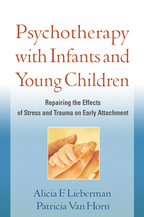Psychotherapy with Infants and Young Children
Repairing the Effects of Stress and Trauma on Early Attachment
Alicia F. Lieberman and Patricia Van Horn
Paperbacke-bookprint + e-book
Paperback
orderMarch 14, 2011
ISBN 9781609182403
Price: $45.00 366 Pages
Size: 6" x 9"
Copyright Date: 2008
This eloquent book presents an empirically supported treatment that engages parents as the most powerful agents of their young children's healthy development. Child–parent psychotherapy promotes the child's emotional health and builds the parent's capacity to nurture and protect, particularly when stress and trauma have disrupted the quality of the parent–child relationship. The book provides a comprehensive theoretical framework together with practical strategies for combining play, developmental guidance, trauma-focused interventions, and concrete assistance with problems of living. Filled with evocative, “how-to-do-it” examples, it is grounded in extensive clinical experience and important research on early development, attachment, neurobiology, and trauma.
“Lieberman and Van Horn present a well-reasoned, well-integrated, admirably stated scholarly review of the various literatures on attachment research, child psychoanalysis, and developmental neurobiology....This is a well-narrated, sumptuous book which provides chicken soup for the clinicians' soul. It reconnects seasoned clinicians with their idealistic roots. It reinforces the fretful novice with its infectious aroma of optimism. Thus, it is a must read for clinicians, foster care workers, protective service workers, teachers, and all pediatric professionals who believe that the internal, unarticulated enactments emitted from the very young must have a meaning that through patient, thoughtful work can be understood, formulated into a captivating narrative and worked into a meaningful, transformative treatment plan.”
—The National Psychologist
“An essential book for those who work with traumatized young children and their families.”
—PsycCRITIQUES
“This riveting book provides a comprehensive description of how attachment can be disrupted by stress and trauma—and how it can be mended through child-parent psychotherapy, an empirically supported treatment for infants, preschoolers, and their primary caretakers. Using the credo of 'starting with simplicity,' or developmental guidance, and moving on to behavioral and cognitive interventions and interpreting children's and parents' inner lives, this book is rich with diverse, illuminating clinical examples. Developmental psychologists, therapists, and anyone else working with traumatized infants and preschoolers should read this gem of a book. This is a wonderful text for training advanced graduate students in developmental psychology, infant psychology, and trauma psychology.”
—Judith A. Cohen, MD, Medical Director, Center for Traumatic Stress in Children and Adolescents, Allegheny General Hospital, Pittsburgh, Pennsylvania
“Lieberman and Van Horn present an extremely sensitive and comprehensive understanding of how their relationship-based approach to therapy can lead both child and parent toward positive mental health. Readers learn how to implement this important therapeutic intervention, with whom to use it, and variations in its use across different systems, such as child welfare and the judicial system. All mental health practitioners working with young children will benefit from the vivid clinical examples that bring to life the process of change. This superb book demonstrates the importance of working in the relationship in early development, and illustrates beautifully how to intervene to change maladaptive patterns.”
—Joy D. Osofsky, PhD, Paul J. Ramsay Chair, Departments of Pediatrics and Psychiatry, Louisiana State University Health Sciences Center
“This long-awaited book definitively describes child–parent psychotherapy, one of the most important and effective interventions in infant mental health. The authors are master clinicians who repeatedly place the reader in the trenches of clinical dilemmas and never disappoint with their thoughtful considerations of what transpires there. With clear and illuminating prose and richly evocative vignettes, this book is 'must' reading for child clinicians.”
—Charles H. Zeanah, Jr., MD, Mary Peters Sellars-Polchow Chair in Psychiatry and Professor of Psychiatry and Pediatrics, Tulane University School of Medicine
Table of Contents
1. When Development Falters: Putting Relationships First2. Coping with Danger: The Stress–Trauma Continuum
3. Practicing Child–Parent Psychotherapy: Treatment Targets and Strategies
4. The Assessment Process
5. "Not Quite Good Enough": Perturbations in Early Relationships
6. Ghosts and Angels in the Nursery: Treating Disturbances and Disorders
7. Variations in Child–Parent Psychotherapy
8. Lapses in Attunement: Failures in the Therapeutic Relationship
9. Integrating Child–Parent Psychotherapy with Other Service Systems
10. Closing Thoughts: Taking Perspective
About the Authors
Alicia F. Lieberman, PhD, is Irving B. Harris Professor of Infant Mental Health and Vice Chair for Academic Affairs in the Department of Psychiatry, University of California, San Francisco, and is Director of the Child Trauma Research Project at San Francisco General Hospital. She directs the Early Trauma Treatment Network, a collaborative of four university-based programs that is a center of the Substance Abuse and Mental Health Services Administration (SAMHSA) National Child Traumatic Stress Network. She is president of the board of directors of Zero to Three: The National Center for Infants, Toddlers and Families. Dr. Lieberman is the author of The Emotional Life of the Toddler and senior author of Losing a Parent to Death in the Early Years: Guidelines for the Treatment of Traumatic Bereavement in Infancy and Early Childhood and Don’t Hit My Mommy!: A Manual for Child-Parent Psychotherapy with Young Witnesses of Family Violence, among numerous other publications. Her major interests include infant mental health, early trauma, and closing the service gap for minority and underserved young children and their families.Patricia Van Horn, JD, PhD, is Associate Clinical Professor in the Department of Psychiatry at the University of California, San Francisco, and Associate Director of the Child Trauma Research Project. She serves as technical assistance provider and clinical consultant to the San Francisco Safe Start Initiative and has trained clinicians nationally and abroad in child-parent psychotherapy through the SAMHSA National Child Traumatic Stress Network and the Safe Start Promising Practices Initiative. She is the author of a child trauma training curriculum for advocates serving women and children affected by domestic violence and a coauthor of Don’t Hit My Mommy! and Losing a Parent to Death in the Early Years.
